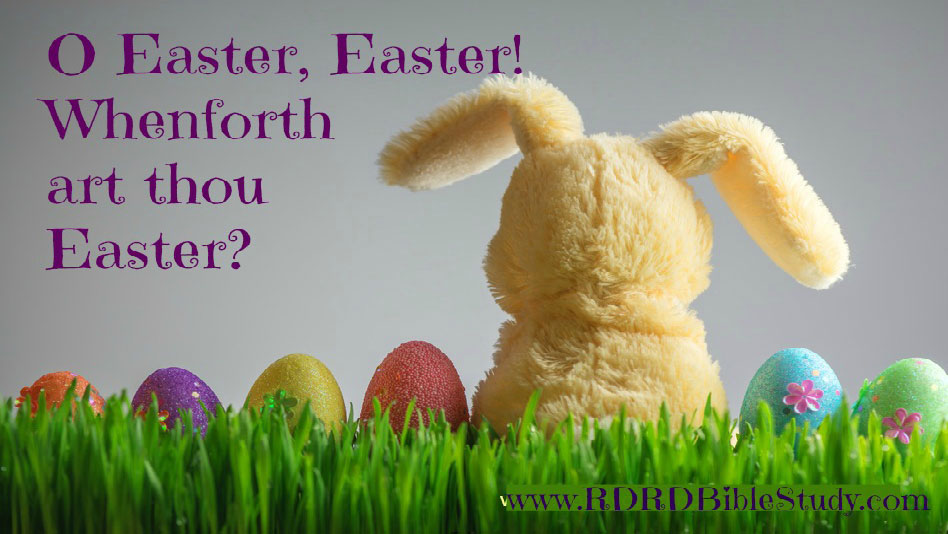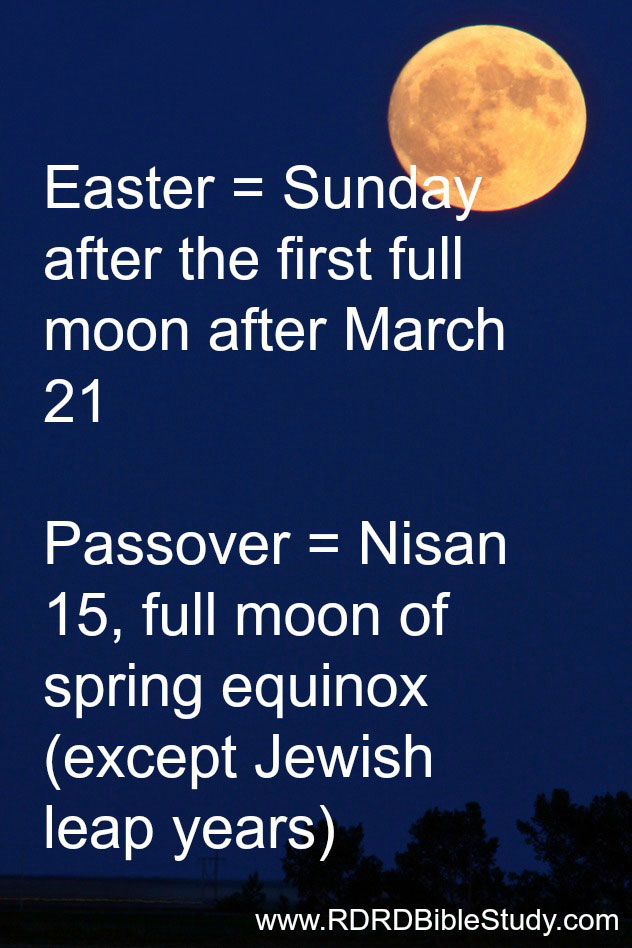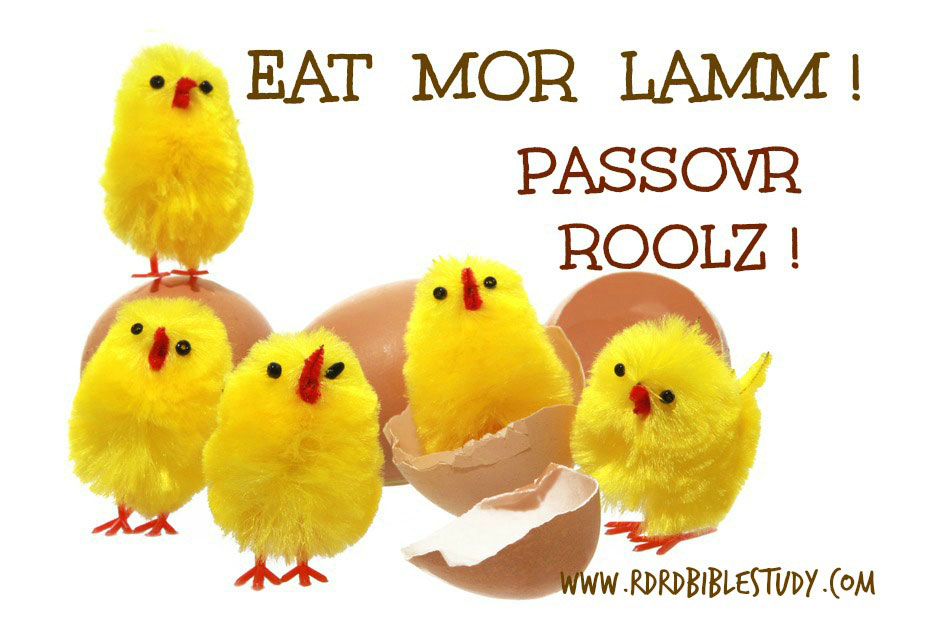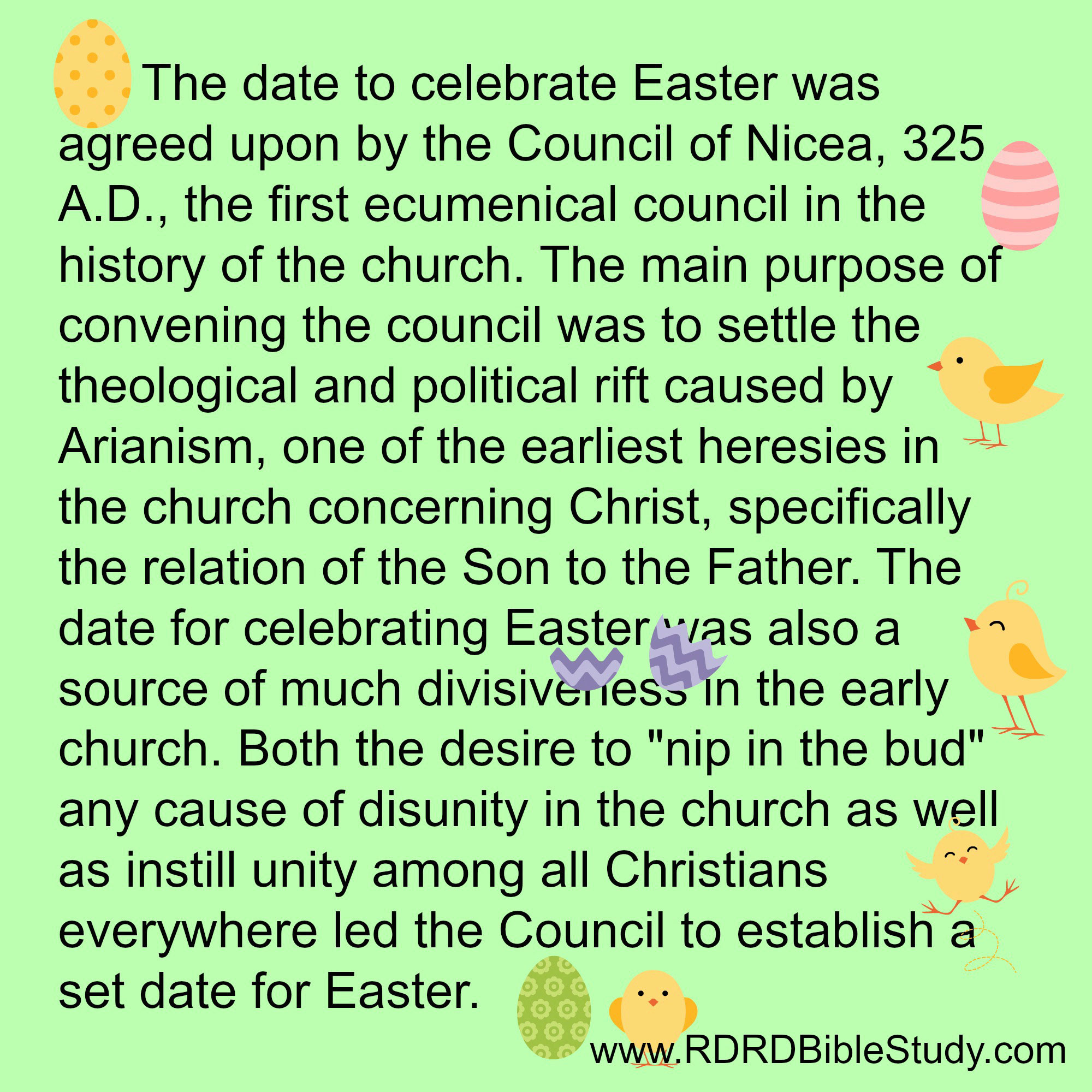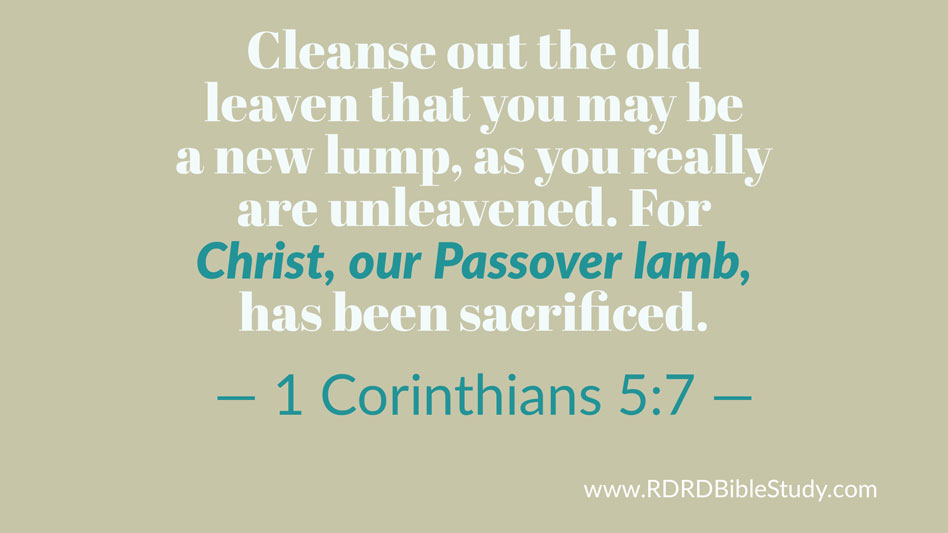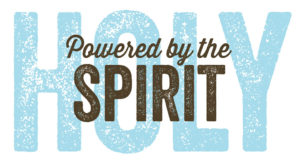A friend at work asked “What’s up with the dates of Passover and Easter not being on the same weekend every year?” So I thought the explanation would make a great post.
Here goes…
What is Passover?
The origin of Passover is recorded in Exodus 12. The Israelites are given guidelines for preparing a Passover Meal. And they are instructed to smear the blood of a sacrificial lamb on the tops and frame of the doorways of their homes.
For the LORD will pass through to strike the Egyptians, and when he sees the blood on the lintel and on the two doorposts, the LORD will pass over the door and will not allow the destroyer to enter your houses to strike you. Exodus 12:23
The “passing through” is the 10th plague to fall on Egypt. Subsequently, God would lead the people out of Egypt and through the Red Sea, marking the miraculous redemption of the Jewish people from Egyptian slavery. A promise foretold to the Hebrew patriarch Abraham 430 years earlier (Gen. 15:13).
Passover is the defining festival of the Jewish people. It is a time set aside to remember the faithfulness of God and the powerful work that God did on behalf of His people:
You shall observe this rite as a statute for you and for your sons forever. 25 And when you come to the land that the LORD will give you, as he has promised, you shall keep this service. 26 And when your children say to you, ‘What do you mean by this service?’ 27 you shall say, ‘It is the sacrifice of the LORD’s Passover, for he passed over the houses of the people of Israel in Egypt, when he struck the Egyptians but spared our houses.’ “And the people bowed their heads and worshiped. Exodus 12:24-27
It was a night of watching by the LORD, to bring them out of the land of Egypt; so this same night is a night of watching kept to the LORD by all the people of Israel throughout their generations. Exodus 12:42
In the book, Jewish Holidays: A Brief Introduction for Christians (Jewish Lights Publishing, 2007), Rabbis Kerry M. Olitzky and Daniel Judson say, “The redemption from Egypt is the ultimate paradigm of freedom and hope in Judaism.” For Christians, this reference to freedom and hope provides evidence of the close theological link between Good Friday and Easter.
The Rabbis continue:
“Passover reminds Jews to be grateful for the freedom that they have and to truly seek freedom for others… The other major theme of the holiday is remembering. Passover is, in fact, the only holiday in the Bible where the Jewish community is explicitly told to pass the meaning of the holiday down to our children.”
Both themes of freedom and remembering are found in Deuteronomy as Moses prepares the people to enter the Promised Land. One reference precedes the recitation of the 10 commandments (Deut. 5:15), and the other 4 have to do with how the Israelites are to act toward the marginalized of society (Deut. 15:15, 16:12, 24:18, 22). For example:
When you gather the grapes of your vineyard, you shall not strip it afterward. It shall be for the sojourner, the fatherless, and the widow. 22 You shall remember that you were a slave in the land of Egypt; therefore I command you to do this. Deuteronomy 24:21-22
The importance of the Passover in OT Theology can be seen in the number of references to Passover in the Torah. Exodus 12 has already been mentioned. Leviticus 23, Numbers 28, and Deuteronomy 16 all contain Passover legislation. Numbers 9 records Passover at Mt. Sinai.
The book of Joshua, the first historical book after the Torah, recounts the Israelites’ entry into the Promised Land. And as God would have it, just in time to celebrate Passover (Joshua 5), making it the first festival celebrated in the Promised Land.
When is Passover?
Could you imagine a more perfect time than during the grandeur of a full moon to begin a celebration to remember the awesome promises of God, both past and future?
A Jewish day begins at sunset. Whereas our day goes from midnight to midnight, a Jewish day is sunset to sunset.
Passover begins at sunset on the 15th of the Jewish springtime month of Nisan which usually corresponds to April.
The Jewish year follows a lunar calendar which has 360 days. The first full moon following the Spring Equinox** marks the beginning of Passover.
**According to www.timeanddate.com–
There are two equinoxes each year:
- Spring, aka March or Vernal, Equinox
- Fall, aka September or Autumnal, Equinox
An Equinox happens:
- When the Sun shines directly on the equator
- And the length of the night and day are nearly equal
The Spring Equinox happen
- As the Sun crosses the celestial equator from south to north
- (Celestial Equator = The imaginary line in the sky above the equator)
- On March 19, 20, or 21 every year
What is Easter?
Easter is the day the Christian church celebrates Jesus’ Resurrection. The Sunday before Easter is Palm Sunday commemorating Jesus’ triumphal entry into Jerusalem, which leads up to His crucifixion on Friday, i.e. Good Friday, which is the Day of Preparation for Passover in the Gospels.
The Synoptic Gospels record The Last Supper as a Passover meal. Jesus and His disciples were Jewish so they would have definitely celebrated this meal.
These little chicks are all about celebrating Passover.
Jesus was crucified before Passover—which began at sunset. This is why the Jews asked Pilate to take the bodies off the cross—before Passover began, i.e. “that Sabbath was a high day” (Can you name the irony in this?).
31 Since it was the day of Preparation, and so that the bodies would not remain on the cross on the Sabbath (for that Sabbath was a high day), the Jews asked Pilate that their legs might be broken and that they might be taken away. 32 So the soldiers came and broke the legs of the first, and of the other who had been crucified with him. 33 But when they came to Jesus and saw that he was already dead, they did not break his legs. John 19:31-33
Just as the Israelites in the first Passover expressed faith in the blood of the lamb to save them from judgment, so today, we who place our faith in the blood of Christ, our Passover lamb, are set free from death and saved from eternal judgment (1 Cor. 15:50-58).
When is Easter?
The date of Easter is a little more complicated than the date for Passover. In Christian history, attempts were made to celebrate Easter on or around Passover, but that did not work out.
In 325 A.D. the Council of Nicaea decided that Easter Day would be on the first Sunday after the first full moon occurring on or after the ecclesiastical approximation of March 21 for the Spring Equinox. If the full moon is on Sunday, then Easter is delayed one week.
(Eastern Orthodox churches still determine Easter Day based on the Julian calendar and the actual dates of the astronomical full moon and vernal equinox. Eastern Orthodox Easter will never occur before April 3, because April 3 is the same day as March 21, 325. Complicated, right?)
For example:
2015
Spring Equinox (SE) – March 20, UTC (Coordinated Universal Time)
Church (ecclesiastical) SE Approx. – March 21
Passover begin – Nisan 15/April 3
Easter – April 5
**this year worked out nicely, April 3 Passover/Good Friday, and April 5 Resurrection/Easter.
2014
Spring Equinox – March 20 UTC
Church (ecclesiastical) SE Approx. – March 21
Passover begin – Nisan 15/April 14
Easter – April 20
2013
Spring Equinox – March 20 UTC
Church (ecclesiastical) SE Approx. – March 21
Passover begin – Nisan 15/March 25
Easter – March 31
2016
Look what happens—Easter is before Passover
Spring Equinox – March 20 UTC
Church (ecclesiastical) SE Approx. – March 21
Passover begin – Nisan 15/April 22
Easter – March 27
Using the full moon schedule below, the first full moon after March 21 is March 23.
- According to the Council of Nicaea, Easter is on the first Sunday after the first full moon after the Spring Equinox, so March 27, 2016.
- Passover is on Nisan 15 like always. This corresponds to April 22, 2016, which is the next full moon.
Here is the Full Moon Schedule for 2016 UTC.
Sunday, 24 January 2016, 02:45:48 am
Monday, 22 February 2016, 07:19:54 pm
Wednesday, 23 March 2016, 01:00:54 pm
Friday, 22 April 2016, 07:23:42 am
Saturday, 21 May 2016, 11:14:30 pm
Monday, 20 June 2016, 01:02:24 pm
Wednesday, 20 July 2016, 12:56:36 am
Thursday, 18 August 2016, 11:26:36 am
Friday, 16 September 2016, 09:05:06 pm
Sunday, 16 October 2016, 06:23:06 am
Monday, 14 November 2016, 02:52:06 pm
Wednesday, 14 December 2016, 01:05:36 am
You must be thinking, but, but, but… you just said Passover begins at the first full moon after the Spring Equinox. And you are correct! But calendars and keeping time can get quite complicated! Even Daylight Saving Time drives me cray-cray.
Why Is Passover Sometimes After Easter?
Read the response to the question about Passover being after Easter from Dr. Mitch Glaser, President of Chosen People Ministry. (or Read the full article of FAQ about The Passover from Dr. Glaser.)
How is the timing of Passover calculated? Why does Passover sometimes fall after Easter? The two holidays are based on two different calendars. Easter is based on the solar calendar, the calendar commonly used today. In Western churches, Easter is dated as the first Sunday after the first full moon of spring. It therefore occurs somewhere between March 22 and April 25. Eastern Orthodox churches have a different approach based on the lunar calendar.
Passover, on the other hand, is based on the Jewish calendar, a lunar calendar that has twelve 28-day months. Every two or three years, there is a thirteenth month called Adar II included in the calendar. Over the course of a 19-year cycle, this “extra” month occurs in the 3rd, 6th, 8th, 11th, 14th, 17th, and 19th years. The year 2008 was one of those years with an extra month. Passover occurs from the 15th to the 21st of the month of Nisan – which is the month right after the “extra” month of Adar II. The inclusion of the “extra” month in the lunar calendar thus caused Passover to fall nearly 30 days after Easter in 2008.
So finally to answer my friend’s question…
Why Are Passover and Easter Not On the Same Weekend?
With all the calendar background behind us, the simple answer is:
- Passover is a Jewish Holiday with a Biblical mandate that it begin on Nisan 15, which could occur on any day.
- Easter is a Christian holiday and Easter Sunday is still determined by the guidelines set by the Council of Nicaea. The Council didn’t do this arbitrarily, it had its reasons.
Christian Churches And Passover Today
Today many churches have someone come during Easter time to lead them through a Passover Seder. Rabbis Olitzky and Judson say that rarely a year goes by that they aren’t invited to a church to lead a Passover Seder (89). The National Director of CMJ USA, The Rev. Cn. Daryl Fenton, wrote in CMJ USA’S March 2015 newsletter
“Across the world this year more people will be celebrating Pesach (Passover) than any other time in history. . .and the majority of them are likely to be gentile Christians. Ministries like CMJ have their busiest time of year leading Passover Seders. Some churches now celebrate this most traditional of Jewish holidays.”
Rabbis Olitzky and Judson refer to the Gentile celebration of Passover as a “recent emergence in so many churches.”
This was not the case in the early church.
The main purpose of the Council of Nicaea centered on a controversy over the divinity of Christ called Arianism. This heretical teaching was causing much divisiveness in the church. It was not the first and definitely not the last.When the Council of Nicaea was held the dating of Easter Sunday was also causing divisiveness in the church. Some Christians calculated Easter Sunday according to the Jewish calendar, and others did not, believing it needed to be kept separate from the Jewish celebration of Passover.
The Council decided that Easter Sunday, the celebration of the Resurrection, should be kept separate from the Jewish celebration of Passover. Though the NT records the historical and theological connection between Passover and Christ’s Resurrection, the Council agreed that theologically, Christ’s death and Resurrection fulfilled the Passover festival as mandated in OT Law—Passover looks forward to God sending a Deliverer/Messiah whereas the fundamental belief of Christianity is that Jesus is God’s promised Messiah.
The fulfilment of Passover is attested to in the NT. Paul explicitly links the Passover sacrifice with Christ’s sacrifice on behalf of sinners:
Cleanse out the old leaven that you may be a new lump, as you really are unleavened. For Christ, our Passover lamb, has been sacrificed. 1 Corinthians 5:7
Additional Questions You May Have About The Church
Additional questions you have may be something like this:
1) Why would the early church want to keep Easter and Passover celebrations separate? And,
2) Why does it seem the church has gone full circle and now a lot of churches celebrate a Passover Seder?
Both answers could be a full blog post(s), so I am intentionally keeping it brief. And please, feel free to leave a comment sharing your thoughts in response to the two questions above. I want to hear from you.
Early Church – On the Council of Nicaea’s agenda in 325 A.D., the main issue of Arianism represented a thorn bush of disunity, and the question of Easter Sunday a tiny thorn. The Council exercised great wisdom by addressing the question of the when of Easter Day and nipping it in the bud, or the thorn (?). This issue had potential to grow into something substantially misleading, i.e. the mixing of Jewish and Christian practices which would have probably become tradition, subsequently written as mandates into the annals of the Roman Catholic Church.
“Judaizing” represented one of the very first heresies in the church. Recall Paul’s letter to the Galatians and how he denounced those Christian Jews who were telling non-Jewish Christians they needed to keep parts of the Jewish Law in order to be right with God, i.e. encouraging circumcision, various feasts, etc. And Paul is not the only one who dealt with Judaizers. After Paul’s teachings on law and grace, freedom and bondage, could you imagine the early council enforcing something that contradicted these teachings?
Contemporary Church – Relations between Jews and Gentiles have improved dramatically over the centuries. And along with increased interest in OT Bible study, Christians sincerely desire to understand the roots of their faith—Judaism. Old Testament narratives provide concrete symbols and images of New Testament spiritual realities. The Passover, a foreshadowing of Christ, and Jesus Christ Himself, are both God’s miraculous redemption of His chosen people from bondage and death to freedom and life. Participation in a Passover Seder edifies a Christian’s theological and spiritual understanding of the great work Jesus has done and is still doing today.
Today a church, as a local body, decides for themselves about celebrating a Passover meal. The Council of Nicaea (made up of 300 bishops from churches in the surrounding provinces) was making decisions that affected the worldwide church. Can you imagine if this council had mandated something NOT mandated in the NT?
Until Next Time—
The grace of the Lord Jesus Christ and the love of God and the fellowship of the Holy Spirit be with you all . 2 Corinthians 13:14

